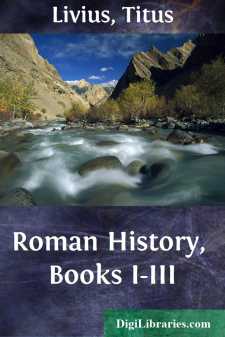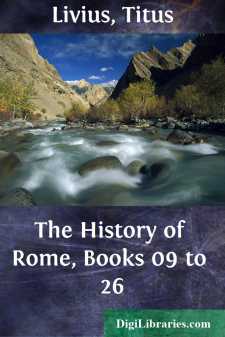Categories
- Antiques & Collectibles 13
- Architecture 36
- Art 48
- Bibles 22
- Biography & Autobiography 813
- Body, Mind & Spirit 142
- Business & Economics 28
- Children's Books 14
- Children's Fiction 11
- Computers 4
- Cooking 94
- Crafts & Hobbies 4
- Drama 346
- Education 46
- Family & Relationships 57
- Fiction 11829
- Games 19
- Gardening 17
- Health & Fitness 34
- History 1377
- House & Home 1
- Humor 147
- Juvenile Fiction 1873
- Juvenile Nonfiction 202
- Language Arts & Disciplines 88
- Law 16
- Literary Collections 686
- Literary Criticism 179
- Mathematics 13
- Medical 41
- Music 40
- Nature 179
- Non-Classifiable 1768
- Performing Arts 7
- Periodicals 1453
- Philosophy 64
- Photography 2
- Poetry 896
- Political Science 203
- Psychology 42
- Reference 154
- Religion 513
- Science 126
- Self-Help 84
- Social Science 81
- Sports & Recreation 34
- Study Aids 3
- Technology & Engineering 59
- Transportation 23
- Travel 463
- True Crime 29
Titus Livius
Titus Livius, known as Livy, was a Roman historian who lived from 59 BCE to 17 CE. He is best known for his monumental work "Ab Urbe Condita," which chronicled the history of Rome from its founding to Livy's own time. Though much of his work has been lost, the surviving portions provide valuable insights into Roman culture, politics, and military history. Livy's writing is known for its dramatic storytelling and moral lessons, emphasizing Rome's greatness and the virtues of its people.
Author's Books:
Sort by:
by:
Titus Livius
LIVY'S ROMAN HISTORY BOOK I[1] THE PERIOD OF THE KINGS To begin with, it is generally admitted that, after the taking of Troy, while all the other Trojans were treated with severity, in the case of two, Æneas and Antenor, the Greeks forbore to exercise the full rights of war, both on account of an ancient tie of hospitality, and because they had persistently recommended peace and the restoration...
more...
by:
Titus Livius
BOOK XXVII. Cneius Fulvius, proconsul, defeated by Hannibal and slain; the consul, Claudius Marcellus, engages him with better success. Hannibal, raising his camp, retires; Marcellus pursues, and forces him to an engagement. They fight twice; in the first battle, Hannibal gains the advantage; in the second, Marcellus. Tarentum betrayed to Fabius Maximus, the consul. Scipio engages with Hasdrubal, the...
more...
by:
Titus Livius
BOOK IX.B.C. 321-304 23 Titus Veturius and Spurius Postumius, with their army, surrounded by the Samnites at the Caudine forks; enter into a treaty, give six hundred hostages, and are sent under the yoke. The treaty declared invalid; the two generals and the other sureties sent back to the Samnites, but are not accepted. Not long after, Papirius Cursor obliterates this disgrace, by vanquishing the...
more...
by:
Titus Livius
BOOK I. The coming of Æneas into Italy, and his achievements there; the reign of Ascanius in Alba, and of the other Sylvian kings. Romulus and Remus born. Amulius killed. Romulus builds Rome; forms a senate; makes war upon the Sabines; presents the opima spolia to Jupiter Feretrius; divides the people into curiæ; his victories; is deified. Numa institutes the rites of religious worship; builds a...
more...





